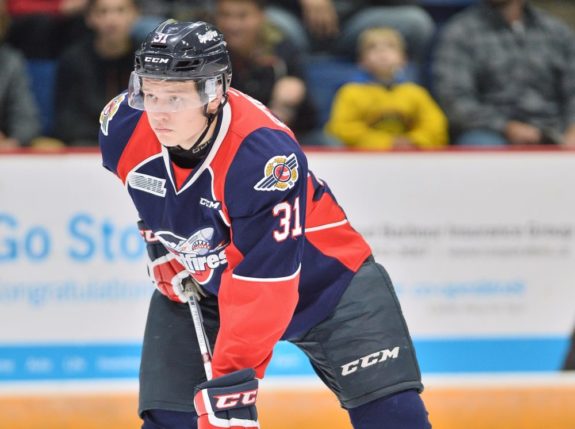One of the biggest headlines heading into the 2024 Draft was the trade that brought Mikhail Sergachev to the newly formed Utah Hockey Club from the Tampa Bay Lightning. The Russian defenseman is entering the second year of an eight-year deal with an $8.5 million annual cap hit, and he is expected to play a big role for the Utah franchise. In this translated interview, Sergachev talked about his early years, his desire to play hockey, his move to Utah, becoming a father, and his plans for the future.
***You can enjoy the original talk with Mikhail Sergachev in his native Russian on mentoday.ru here***
Sergachev prepared for the new season at home rather than in North America, where he talked to the press. He started with some memories from his early years. “My first hockey-related memory is the boards of the rink,” Sergachev said. “I’m looking at them, and they’re taller than I am. The next memory is about a year later—I managed to pull off a certain turn, and the coach praised me. For some reason, these are the moments that stuck in my memory.”

“Overall, even as a kid, I had this crazy desire to play. To arrive at the locker room, put my gear on quickly, and head out with the guys. I wanted to outplay opponents, win matches, and triumph in tournaments—everywhere. After practice, I’d take my skates home to skate more on the outdoor rink nearby.”
Sergachev’s Early Years
However, it wasn’t always like that for the defenseman. “My parents tell me there was a time when I wanted to quit hockey—I don’t remember this myself. They say I used to throw tantrums and argue that I wasn’t going to practice anymore. Then they bought me new gear, and that solved everything—I immediately wanted to test it out on the ice.”
RELATED: Utah’s HC Sergachev: From Grassroots to Stardom
In his heart, Sergachev only had room for hockey. “As a kid, I was seriously focused only on hockey. There was also swimming for a while and table tennis because my dad played it, but I don’t think I would have succeeded in that sport—those guys are smaller and quicker. Then, already in adulthood, about six years ago, I started boxing twice a week. Now, I also do track and field, run, and swim with a drag chute in the pool every Wednesday. It brings variety, and it’s probably more for my mind than my body.”
2024-25 Regular Season Preparation
Practicing is important for any athlete, and Sergachev likes to change up his workouts. “You still get tired, prepare your muscles, prepare your body, but you do it differently. You don’t always need to be on the ice, battling, colliding with other players, and so on. There’s a different kind of load here, more interesting than just lifting weights. I’ve had pre-season preparations where I just hit the gym monotonously, and by about the sixth week, my motivation to train would vanish.”

That’s one of the reasons he decided to gear up for the 2024-25 campaign in his native Russia. “When you have weights on Monday, jumps on Tuesday, the pool on Wednesday, running on Thursday, and only back to the gym on Friday, it’s more interesting and, I think, more effective. In fact, part of the reason I came to Moscow this time was for the same variety. When I was preparing for the season in America, it was mentally tough—you need to change the scenery sometimes. Plus, it’s just cool here at home.”
Moving to Canada as a Junior
Sergachev was one of the few Russian players who developed his game in the Canadian junior leagues instead of playing at home. He was drafted by the Windsor Spitfires with the sixth overall pick in the 2015 CHL Import Draft. “When I moved to Canada, it was very difficult for me at first,” Sergachev recalled. “I didn’t know English at the time, and although I was learning it, at the beginning, I couldn’t understand anyone, and no one could understand me. Because of this, I was constantly in a rather depressive state, but hockey saved me. When you step on the ice, there is only one language.”
However, it was still a positive moment in Sergachev’s career. “By the way, I liked that even when I barely spoke English, no one laughed at me; they tried to help. Canadians are very kind guys, always ready to give advice and support. Another psychological crisis for me happened after I broke my leg. That hit me quite hard as well. When I returned to the ice after that injury, I was more nervous than I was before my first game or the Stanley Cup Final, but the warm reception I received is something I will remember for the rest of my life—it was both very difficult and very heartwarming for me.”

Hockey is an emotional sport and it can be tough playing so many games in a season. “There are a lot of games in the regular season,” Sergachev noted. “You don’t always have enough emotions for each one. Many times during intermission, the coach or captain would bring us back to the right mindset with words or even by shouting. For example, Jon Cooper is very good at this. He always knows which strings to pull and on whom. By the way, sometimes a fight has the same invigorating effect—everyone immediately pulls themselves together, and the game changes.”
He also said that hanging out with teammates isn’t that common anymore. “In sports movies, they love to show teams as almost like families, but in reality, we don’t spend that much time together or go out after games,” he explained “That’s more common in junior hockey, where no one has wives and kids yet. Although in Tampa, after we won two Stanley Cups, we did grow very close. We went through such a tough journey together, spent so much time in hotels during the playoffs… Now we call each other, message each other even today.”
Trade to Utah Hockey Club
In June, the Lightning sent Sergachev to Utah for J.J. Moser, prospect Conor Geekie, and draft picks. Not only did he have to deal with a new team and environment, but he will now have to do without his countrymen Nikita Kucherov and Andrei Vasilevsky, with whom he lifted two Cups and spent years together as teammates. “This is my first time being the only Russian on the team,” he said.
“I’ll have to get used to it, but I hope everything will work out. Overall, I like it here in Utah. There are many people in the club with experience working in the NBA, which is the most organized league in the world. You can see that they know how to use their experience for the benefit of the team and hockey as a whole.”
Becoming a Father
Last year, Sergachev and his wife Liza had a son named Fyodor—an homage to the defenseman’s favorite writer, Fyodor Dostoevsky. “Only after becoming a father myself did I truly understand and begin to appreciate how much attention my dad gave and still gives me,” he said. “Before, I took it for granted. All the time during my childhood, he dedicated to me. He was always with me at practices, doing everything for me, and he still does to this day. My dad always calls me after games.”
“Attention is a very important thing for a child, and now I want to be the same kind of father for my son. It doesn’t matter whether he plays hockey or not. I will always be there for him and will support him. Of course, at some point, I’ll need to give him some space. That’s a moment we’ll probably both reach together.”
From the outside, Sergachev seems to have achieved everything one could dream of. But what are his dreams today? “I still want to win a lot,” he stated. “The Stanley Cup, the James Norris Trophy, and, of course, Olympic gold, if possible. But for now, the goal is to make the playoffs with Utah this season. So, there’s still a lot to strive for.”
With his drive and determination to showcase that he’s not just a good player, but something more, Sergachev has all it takes to bring his new team to the playoffs.
